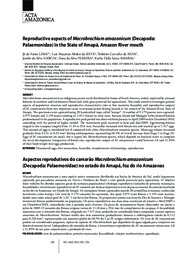Reproductive aspects of Macrobrachium amazonicum (Decapoda: Palaemonidae) in the State of Amapá, Amazon River mouth.
Reproductive aspects of Macrobrachium amazonicum (Decapoda: Palaemonidae) in the State of Amapá, Amazon River mouth.
Summary: Macrobrachium amazonicum is an indigenous prawn vastly distributed in basins of South America, widely exploited by artisanal fisheries in northern and northeastern Brazil and, with great potential for aquaculture. This study aimed to investigate general aspects of population structure and reproductive characteristics (size at first maturity, fecundity and reproductive output) of M. amazonicum from two important areas to artisanal prawn fishing located at the mouth of the Amazon River, State of Amapá. The specimens were captured using 20 handcrafted traps called ?matapi?. A number of 5,179 prawns were captured, 2,975 females and 2,195 males resulting in 1.35:1 female to male ratio. Santana Island and Mazagão Velho showed females predominated in the population. A reproductive peak period was observed from January to April/2009 and in December/2010, coinciding with the period of higher rainfall. The recruitment peak occurred in June and July/2009. Egg-bearing females ranged in size (carapace length) from 11.10 to 29.6 mm. Fecundity increased with female size and reached up to 7,417 eggs. This amount of eggs is considered low if compared with other Macrobrachium estuarine species. Mean egg volume increased gradually from 0.121 to 0.24 mm3 during embryogenesis, representing 68.5% of overall increase from Stage I to Stage III. Eggs of M. amazonicum are small; this is typical for Macrobrachium species, which depends on brackish water to complete the larval development. Irrespective of female size, reproductive output of M. amazonicum varied between 4.8 and 21.85% of their body weight into eggs production.
Publication year: 2014
Types of publication: Journal article
Unit: Embrapa Amapá
Observation
Some of Embrapa's publications are published as ePub files. To read them, use or download one of the following free software options to your computer or mobile device. Android: Google Play Books; IOS: iBooks; Windows and Linux: Calibre.
Access other publications
Access the Agricultural Research Database (BDPA) to consult Embrapa's full library collection and records.
Visit Embrapa Bookstore to purchase books and other publications sold by Embrapa.

